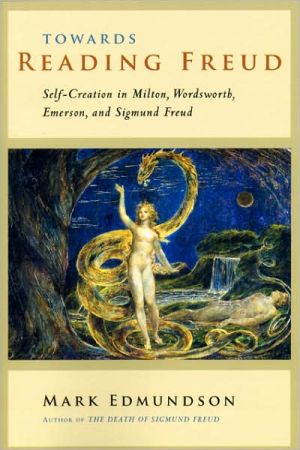

 |

|

The average rating for Towards Reading Freud: Self-Creation in Milton, Wordsworth, Emerson, and Sigmund Freud based on 2 reviews is 3.5 stars.
Review # 1 was written on 2014-08-22 00:00:00 John Cuneo John CuneoThis is a subtle and fascinating book. It might be subtitled - Literature (or Romanticism) strikes back. The author wants to free us from being Freudian subjects because he does not want us to be subjected and he particularly does not want us to be subjects to the master Freud. He thinks the Romantic poets (Wordsworth, Emerson and earlier kindred voices) offer a more attractive approach where the focus is on each individual creating themselves. When he started to write the book, Edmundson intended to cast Freud entirely in the villain role, the harsh enforcer of constricting norms, but as he read Freud he detected a romantic element in him too. Unfortunately, what he sees as unique in Freud is that his romantic self-creation cuts off self-creation for everyone else. For example, while recognition of the Oedipus Complex is a difficult and humiliating moment for everyone, for Freud is also the name of his greatest triumph. Freud does accept that he too is like Oedipus, but in his role of discoverer of the complex he also identifies himself with the Oracle and he ends up in a unique position. On the one hand, his position is the same as everyone else; on the other, it is rather different. Anyway, Edmundson ends up with two Freuds - the Romantic Freud and the normalising Freud and he tracks their interaction in a thought-provoking way. He also uses Milton, Wordsworth and Emerson to explore different possible views of the self which he thinks are less oppressive than the Freudian view. His explorations are sensitive and fascinating, but given the high level of sophistication of most of the book, I found his negative attitude to the psychoanalysis as a practice somewhat surprising. He seems to have a fairly simple negative view of it (take a confused and troubled person and make them feel better by imprisoning them in a rigid view of themselves whose main positive function is to eliminate any scope for questions) and yet as he admits he has no direct experience of it and seems to have read relatively little about it. To that extent, I think the book overreaches itself - it is brilliant at raises questions and creating room for new thoughts, but less impressive in either its negative or its positive conclusions. Having said that, I would definitely recommend it to anyone interested in Freud or psychoanalysis or indeed in much broader issues such as the scope for interesting dialogue between literature and philosophy. |
Review # 2 was written on 2008-05-21 00:00:00 Don Dutcher Don DutcherEdmundson's one of my heroes, but I got little from this, which is probably my fault. |
CAN'T FIND WHAT YOU'RE LOOKING FOR? CLICK HERE!!!